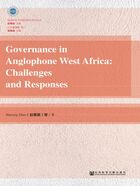
1.3.4 Public Sector Reforms
Years of authoritarian misrule after the 1994 coup under the regime of former president Yahya Jammeh have severely undermined the capacity of the public sector to execute its core functions and the legacy of corruption and patronage have eroded popular confidence in the integrity of public institutions. The situation is different from what pertains in most countries in the West Africa region that have become increasingly stable over the past decade. Jammeh’s regime systematically weakened certain structures of government and warped others to suit its authoritarian purposes. The civil service incentive structure does not encourage performance, and years of mismanagement have stripped public administration of vital physical, financial, and human resources. An especially sharp deterioration in institutional quality has been observed since 2011, and data are not yet available on the state of the public administration in the wake of the political crisis.
The public service in The Gambia has a number of capacity weaknesses: pay is very low, there are difficulties in recruiting and retaining qualified staff, frequent removals and transfers of government officials have undermined job security and institutional knowledge. One significant reason professional staffs were leaving government service was that they were poorly paid. Civil service salaries were low compared with salaries in other low-income countries. The lowest grades could barely afford a bag of rice with their monthly salaries. More detailed assessment of the effectiveness of the government identified some of the major constraints in the public sector as weak capacity for policy-making and strategic planning including human resource management, and little management of employees for performance. Moreover, decades of undemocratic governance had weakened Gambian civil society, diminishing its capacity to demand good governance. The new president announced his intention to “reintroduce civil service reform” and “create a civil service based on merit” that would be “leaner and better remunerated.” The proposed reforms are:
In the short term, the government proposed to:
·develop medium term civil service and pension reform strategies;
·as part of the civil service reform strategy, develop a pay reform strategy which specifically targeted professional and managerial staffs in the higher grades;
·develop more transparent and fair recruitment, promotion and dismissal processes;
·strengthen payroll and establishment controls;
·develop a civil service training policy and reallocate Government training funds from overseas to local training;
·improve manual processes for capturing information on HR transactions.
In the medium term, the government was to:
·continue implementing civil service and pension reform strategies;
·conduct functional reviews to determine ministerial organizational objectives (building on existing sector strategies);
·develop and pilot performance appraisal tools in select Departments;
·overhaul job descriptions and schemes of service;
·reorient the Personnel Management Office and Public Services Commission to play more strategic and regulatory roles and gradually decentralize operational aspects of hiring and promotion to line Departments;
·build local training capacity and allocate more resources to on-the-job and locally based training;
·strengthen policy-making capacity in the Offices of the President and the Secretary General;
·apply a more strategic, long term and coordinated approach to human resources planning and management;
·fully integrate the HR personnel system and the payroll system within an Integrated Financial Management and Information System (IFMIS); and
·apply a more strategic and coordinated approach to human resources management in Education and Health.